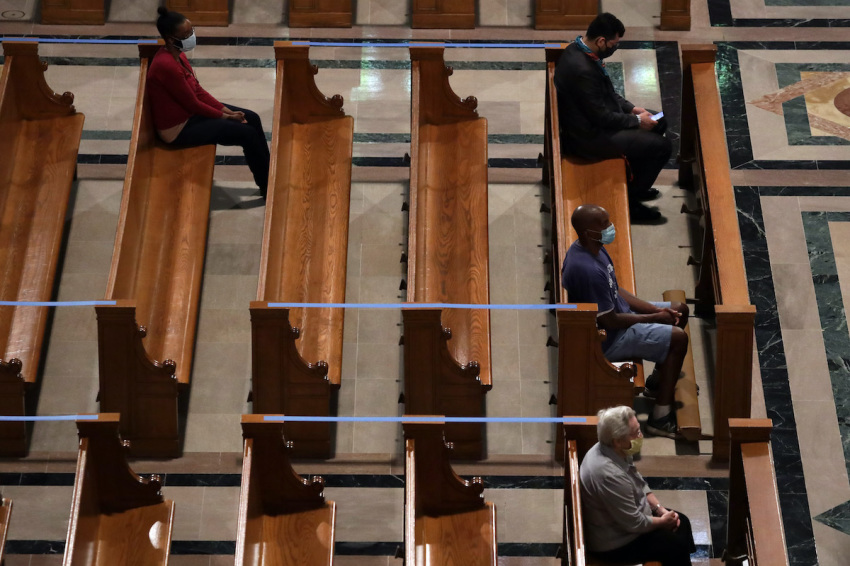New Hampshire passes law prohibiting harsher restrictions on churches during pandemics

New Hampshire has passed a law that prohibits the state government from treating houses of worship with harsher restrictions during times of emergency than organizations and businesses deemed to be essential services.
House Bill 542, an act "relative to the protection of religious liberty,” was signed into law by Gov. Chris Sununu on Tuesday, one of 30 bills signed into law in Concord on that day.
The new law states that during a state of emergency, the state will “permit a religious organization to continue operating and to engage in religious services to the same or greater extent that other organizations or businesses that provide essential services that are necessary and vital to the health and welfare of the public are permitted to operate.”
“Nothing in this section shall prohibit the state government from requiring religious organizations to comply with neutral health, safety, or occupancy requirements issued by the state or federal government that are applicable to all organizations and businesses that provide essential services,” the legislation continues.
“Provided, however, that the state government shall not enforce any health, safety, or occupancy requirement that imposes a substantial burden on a religious service unless the state government demonstrates that applying the burden to the religious service in this particular instance is essential to further a compelling governmental interest and is the least restrictive means of furthering that compelling governmental interest.”
Greg Chafuen, an attorney with the religious freedom legal nonprofit Alliance Defending Freedom, says the new law is an "important step in defending religious freedom in New Hampshire.”
“While public officials have the authority and responsibility to protect public health and safety, the First Amendment prohibits the government from treating houses of worship and religious organizations worse than shopping centers, restaurants, or gyms,” stated Chafuen in a statement Wednesday.
“This bill makes it clear that officials cannot use a public crisis to discriminate against religious operations without violating the Constitution.”
The bill was sponsored by Republican lawmakers. Democrat critics argue that the legislation is unnecessary and that many houses of worship adapted and found other ways to connect during the COVID-19 pandemic.
“I don’t believe we need a new law that prioritizes religious freedoms over public health and safety in a crisis,” New Hampshire state House Rep. Alexis Simpson of Exeter stated in April, as reported by WMUR.
In response to court decisions and protests from religious groups during the COVID-19 pandemic, multiple states have recently considered legislation to guarantee that houses of worship are not treated with harsher restrictions than secular entities during a state of emergency, such as a pandemic.
In April, Indiana Gov. Eric Holcomb signed Senate Enrolled Act 263, which officially labeled houses of worship as essential services.
“Religious organizations provide essential services that are necessary for the health and welfare of the public during a disaster emergency,” the law states.
“[T]he state and a political subdivision may not impose restrictions on … the operation of a religious organization; or … religious services that are more restrictive than the restrictions imposed on other businesses and organizations that provide essential services to the public.”
The Indiana chapter of the American Civil Liberties Union took issue with the law, claiming that it would bestow special treatment to houses of worship.
“The right to exercise one’s faith, including the freedom to hold and attend worship services, is among our most fundamental rights,” stated the ACLU of Indiana in January.
“But religious freedom does not entitle religious institutions to receive special exemptions from the law if it would pose a grave risk to the health and lives of individuals and the public health. SB 263, however, would authorize just that.”
Also, in April, North Dakota passed Senate Bill 2181, which prohibits the state government from treating houses of worship with more restrictive measures than non-religious establishments during times of emergency.
The law states that “any orders relating to disease control measures” cannot substantially “burden a person's exercise of religion unless the order is in furtherance of a compelling governmental interest and is the least restrictive means of furthering that compelling governmental interest."
The North Dakota Catholic Conference expressed its support for the new law.
“The nationwide pandemic has brought renewed attention to how government actions can, intentionally or not, restrict the exercise of religious freedom,” the conference argued in its March 16 letter to state lawmakers.
“For the most part, North Dakota has been spared the imposition of rules and policies unduly interfere with religious activity. Nevertheless, both the state and people of faith could benefit from established protections and parameters in the law.”



























